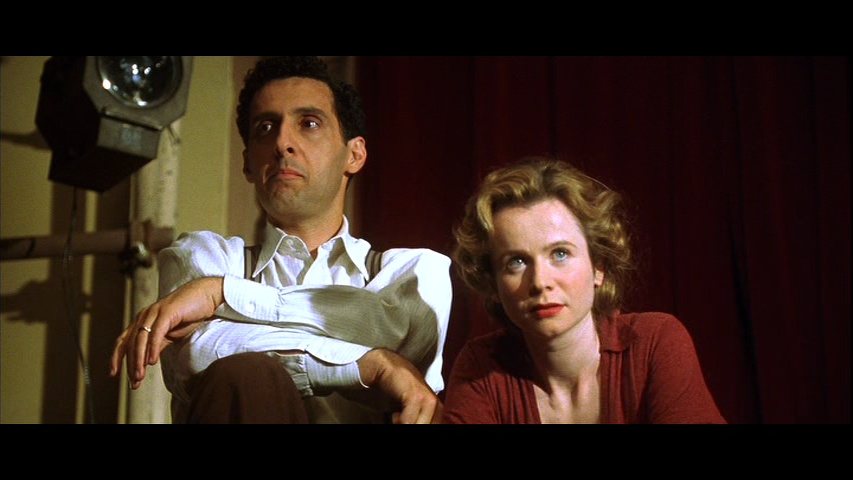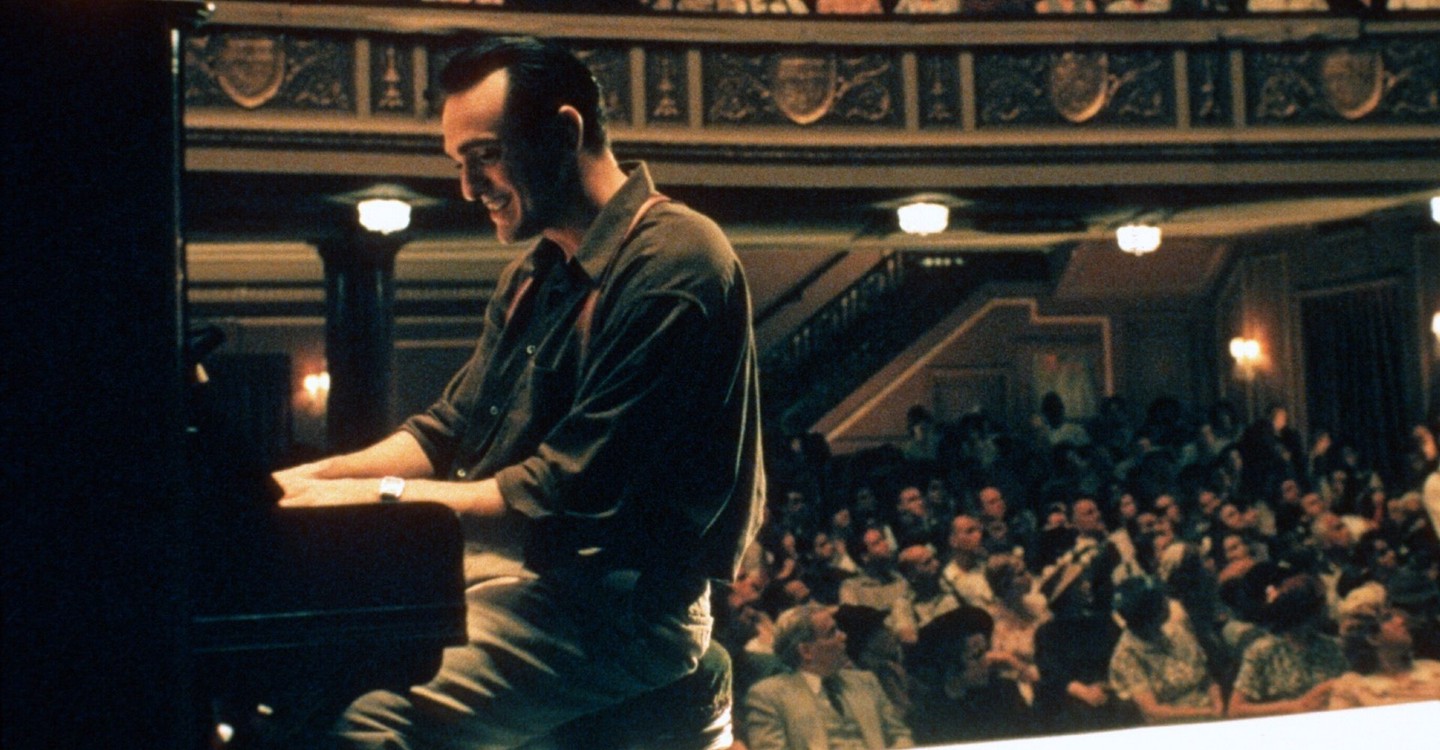Christy by Request — Cradle Will Rock

All art is political in some way. This is especially true of Tim Robbins’ theatrical drama “Cradle Will Rock,” itself inspired by a play that was so provocative in the late 1930s, the U.S. government shut it down before its first performance.
I’d never seen Robbins’ film, the Christy by Request selection of Ottavia Romana (@OttaviaRomana), a Twitter follower of mine in London. (I was very happy that her suggestion came up because it’s the first one so far from a woman, which is a lovely and overdue change. The system is random but apparently the majority of my followers are men.) I can imagine why it appeals to her: “Cradle Will Rock” boasts a tremendous lineup of talent and it wears its righteous political fervor on its sleeve. It’s unabashedly earnest and extremely drama geek-y.
But Robbins isn’t exactly the most subtle filmmaker. He’s long been an outspoken, liberal activist, both in front of and behind the camera. So you know where he stands when he writes and directs a movie about artists using their passion and creativity to rage against fascism abroad and oppression at home as World War II looms in the distance.
Robbins amassed an all-star cast in 1999 to embody the real-life figures behind this infamous stage production and their contemporaries; a title card teasingly informs us this is “A (mostly) true story.” John Cusack is Nelson Rockefeller. Angus Macfadyen is Orson Welles. Cary Elwes is John Houseman. Ruben Blades is Diego Rivera. And Susan Sarandon, Robbins’ former longtime love, is Margherita Sarfatti, Mussolini’s propagandist and one-time mistress. It’s a who’s-who playing a who’s-who.
But “Cradle Will Rock” tries to get its arms around too much, blending events surrounding the Federal Theater Project’s doomed production of the 1937 musical “The Cradle Will Rock” with the work of other artists — both real and imagined — from various points in the decade. His camera roams fluidly from the start, linking one character and storyline to the next and the next until they all join together for the film’s climactic, makeshift performance. But the road there is heavily laden with on-the-nose speechifying that’s single-minded and strident.
We begin with Emily Watson as struggling actress Olive Stanton, awakening from a nap on stage behind a movie screen that’s playing a newsreel about Mussolini and Hitler. As she gets up and walks the streets of Manhattan, she passes Joan Cusack’s anti-communist crusader Hazel Huffman posting flyers. Music fills the streets, and as Olive stoops to wash herself with water from a fire hydrant, Robbins’ camera tilts up to an open window, entering an apartment. Inside, we see Hank Azaria as composer Marc Blitzstein, sitting at a piano and tinkering with a tune. Long, smooth takes like this reveal the subtlety Robbins is capable of; Blitzstein’s work, however, will eventually form the literal, heavy-handed backbone of “The Cradle Will Rock.”
As is often the case in films about the theater, though, the auditions and rehearsals are consistently humorous; the process of making yourself vulnerable in this way offers such recognizable humanity. Macfadyen chews the scenery as a demanding and difficult pre-“Citizen Kane” Welles, ranting: “You have no respect for the the-a-tah!” Meanwhile, Vanessa Redgrave seems to be having a giggly, goofy good time as a countess dipping her toe into this scruffy theatrical world. “I’ve always wanted to watch the process of art-making!” she gushes to Elwes’ Houseman, who will go on to produce “The Cradle Will Rock” with Welles serving as director.
Bill Murray as a delusional, self-serious ventriloquist is always good for a laugh, as are Jack Black and Kyle Gass — then of the rock duo Tenacious D — as eager students who yearn to learn from him. “I’m not a teacher. I’m an entertainer!” Murray’s character yells at Cherry Jones as Hallie Flanagan, director of the Federal Theater Project. “Vaudeville will be around long after you and your communists are!”
 Meanwhile, John Turturro brings great life and truth to his role as actor struggling post-Great Depression to support his four kids (including a newborn) and his wife (the great German actress Barbara Sukowa) on his meager pay, although he hopes that landing the lead in “The Cradle Will Rock” will turn things around.
Meanwhile, John Turturro brings great life and truth to his role as actor struggling post-Great Depression to support his four kids (including a newborn) and his wife (the great German actress Barbara Sukowa) on his meager pay, although he hopes that landing the lead in “The Cradle Will Rock” will turn things around.
Robbins meanders between all these stories but also intercuts them with heady political conversations between the assorted artists and aristocrats who mingled during the era. He contrasts John Cusack’s Rockefeller joyfully dancing at a naked, interracial soiree at Diego Rivera’s loft with the uptight punch-drinking meeting at Joan Cusack’s apartment to discuss ridding the theater of “reds.” The insistent ideology and the rat-a-tat dialogue is relentless, which makes the low-key romance between Olive and fellow actor John Adair (Jamey Sheridan) such a welcome change of pace.
The melange can be whimsical, knowing, even surreal, especially as Robbins takes historical license, mixing themes and historical events that occurred during various times in the decade as if they were all happening simultaneously. The painting and subsequent destruction of Rivera’s mural “Man at the Crossroads” in Rockefeller Center, for example, took place in 1933 — years before the play was even written. This must be what that (mostly) true warning was about off the top.
But when the government orders the shutdown of “The Cradle Will Rock,” locking the theater doors and placing armed guards outside to keep anyone from entering, the Plan B the players come up with is truly ingenious. Watching how the production plays out is far more engaging then the superficial content itself. The way they stage it is so clever because they don’t actually stage it at all; you never know where the actors are coming from or where they’re going, making the process of spectating feel interactive and alive.
The let’s-put-on-a-show energy can be intoxicating. But man, does it take a long time to achieve that high.


I haven’t seen Cradle Will Rock or if I have seen it, it was so long that I don’t remember much of it so I will fix that.
When it comes to films directed by Tim Robbins I have seen Bob Roberts several times so I will talk about that film…
The thing is when Robbins is attempting to do a political film or a mockumentary satire like in the case of Bob Roberts he’s not even attempting to be subtle but goes balls to the wall to portray how evil and corrupt the other side is and how perfect is the side that he supports.
So like in the case with his other filmd he’s extremely biased in portraying certain characters
Review Magnolia (1999)
Hmmm….I really likethis movie, and I love the cast of characters. You have to admire that cast, which is made up of the best character actors from the 1990s (maybe the GREATEST character actor showcase in any movie of the 90’s?) But I know what you mean Christy, it’s almost like it is a movie that is easy to admire but hard to love/like. I would not consider myself a leftist per se, but i do admire Robbins stance just like i enjoyed Warren Bettey’s take in his masterpeice Reds (1981). It’s not quite on the level of Reds, but Cradle will Rock does way more right than wrong in my opinion and like you said it earns its ending. I’d say an 8 / 10 for a rating.
Hmmm….I really like this movie, and I love the cast of characters. You have to admire that cast, which is made up of the best character actors from the 1990s (maybe the GREATEST character actor showcase in any movie of the 90’s?) But I know what you mean Christy, it’s almost like it is a movie that is easy to admire but hard to love/like. I would not consider myself a leftist per se, but i do admire Robbins stance just like i enjoyed Warren Bettey’s take in his masterpiece Reds (1981). It’s not quite on the level of Reds, but Cradle will Rock does way more right than wrong in my opinion and like you said it earns its ending. I’d say an 8 / 10 for a rating.